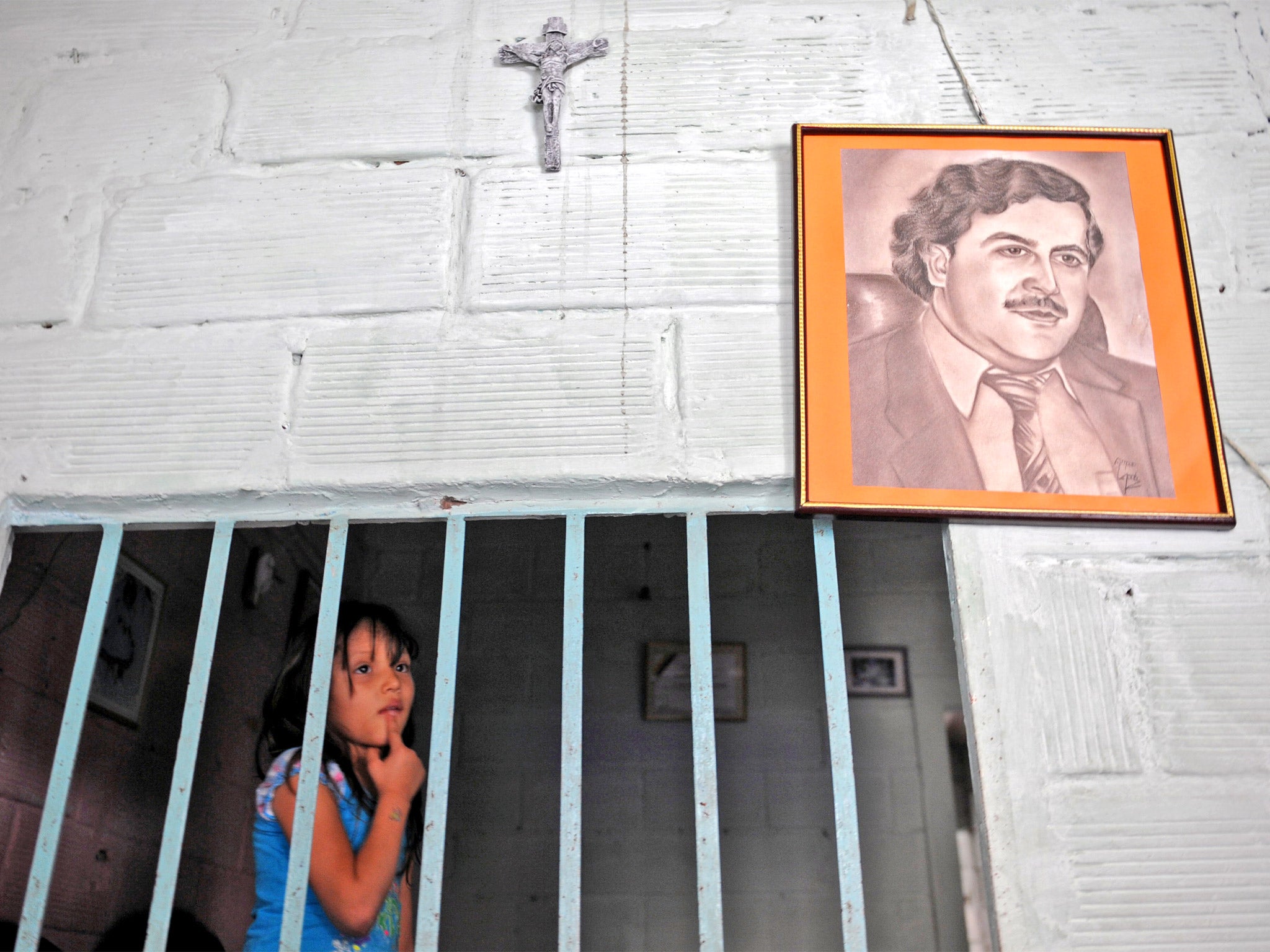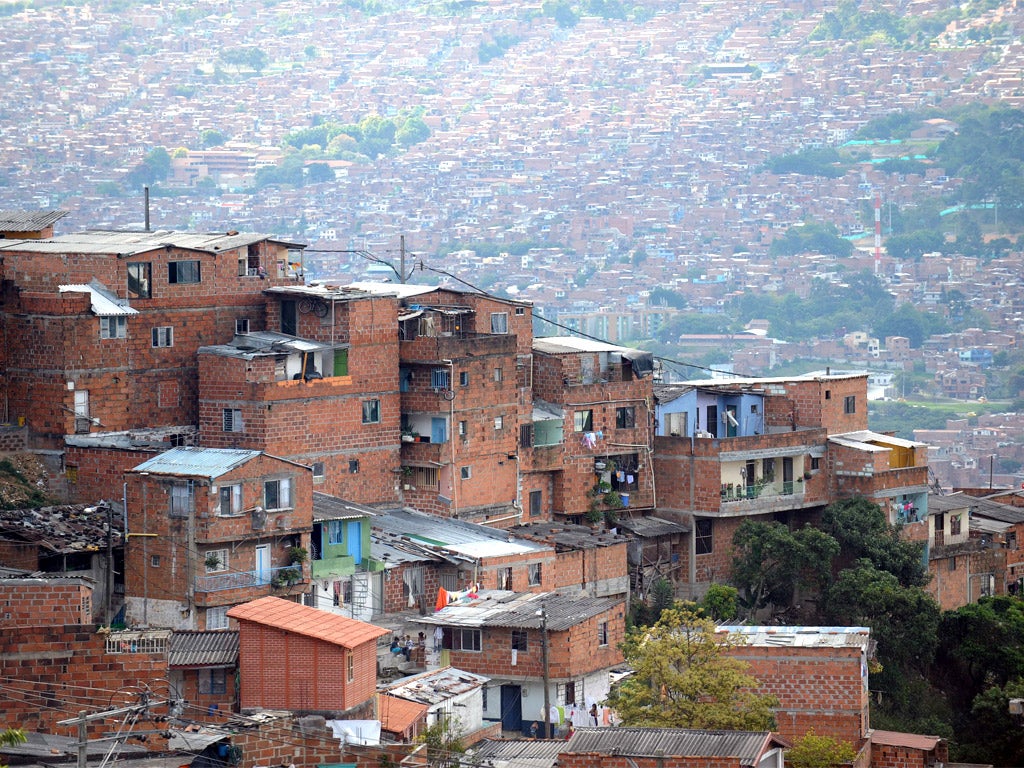Colombia: The virgin auctions in Pablo Escobar’s home town
Behind Medellin's cosmopolitan façade, the town's street gangs entrap girls as young as 10 then sell them to the highest bidder

Your support helps us to tell the story
From reproductive rights to climate change to Big Tech, The Independent is on the ground when the story is developing. Whether it's investigating the financials of Elon Musk's pro-Trump PAC or producing our latest documentary, 'The A Word', which shines a light on the American women fighting for reproductive rights, we know how important it is to parse out the facts from the messaging.
At such a critical moment in US history, we need reporters on the ground. Your donation allows us to keep sending journalists to speak to both sides of the story.
The Independent is trusted by Americans across the entire political spectrum. And unlike many other quality news outlets, we choose not to lock Americans out of our reporting and analysis with paywalls. We believe quality journalism should be available to everyone, paid for by those who can afford it.
Your support makes all the difference.It is a phrase now commonly heard in the hillside slums of Medellin, Colombia: “Take care of your daughter, or she will be sold.” The warning – or threat, depending on who is talking – is literal. The street gangs that rule the slums known as comunas are recruiting 10 to 15-year-old girls and auctioning off their virginities to drug lords and foreign tourists.
The girls are selected for their looks, and then approached by gang leaders or other girls already involved in the gang life, who act as recruiters.
“They start drawing them in with perks from a culture of high consumerism,” says Luis Pardo, Director of NGO Corporacion Consultoria de Conflicto Urabano (C3), which has been investigating the phenomenon over the last year. “They offer them brand-name clothes, trips to luxury restaurants, top of the range whisky and cocaine, and the girls end up as part of this network.”
Once in the sphere of the gang’s influence, the girls fall under their protection. “When it is decided that a girl is to be auctioned off, no man in the neighbourhood can touch her, no one can hassle her and, most of all, no one can take her virginity,” says Pardo.
The girls’ families are caught in the classic bind of organised crime. If they accept the overtures of the gangs, they receive financial help to ease the desperate poverty of life in the comunas. If they refuse, they can either leave their homes and join the ranks of the more than 10,000 people displaced within the city each year, or they can wait for the bullet fired from the back of a passing motorbike, or the knock on the door that will signal the last time they are seen alive.
Reporting the advances is rarely an option as it is the gangs and not the state that are the true authorities in the comunas. The gangs not only control criminal activities, they also regulate day-to-day life, even resolving disputes between neighbours and charging their own taxes in the form of the daily or weekly “vaccination” – local slang for extortion fees.
The gangs operate as the foot soldiers of Medellin organised crime, controlling territories on behalf of one of two warring mafia networks; the remnants of drug kingpin Pablo Escobar’s criminal empire, now called the Oficina de Envigado; and the narco-paramilitary army known as the Urabeños. These associations ensure the gangs’ reach stretches far beyond the neighbourhoods they control and even extends deep into the state security institutions, where corruption is rampant. The gangs’ connections not only facilitate the movement of the girls through criminal networks, they also all but guarantee the silence of the victims.
“People are scared to report it, even talk about it because of the fear of these armed actors,” says one youth worker in the city’s violence-torn Comuna 13 district, who has seen girls under his care disappear into gang life, and who did not want to be identified for fear of reprisals. “Silence has become an accomplice.”

Victims contacted by The Independent said that since the revelations in the C3 report, gangs had issued them warnings that they would be killed if they talked about their experiences.
With the families powerless to intervene, the girls are prepared for auction. Some are offered up for the orgies thrown by the drug lords and mafia kingpins that control the Colombian underworld, continuing a tradition begun by Pablo Escobar, whose demand for teenage virgins was notorious. Once sold off, few return.
“This is a girl’s first [sexual] experience,” said Pardo. “They pass from the hands of one capo to other capos and by the end they have become prostitutes.” Many are sold to foreign tourists. The security improvements of the last decade, which have helped change Medellin’s international reputation from that of a war zone ridden with drugs and extreme violence to a thriving cosmopolitan city, have opened it up to tourism. However, with the city’s reputation for beautiful women and Colombia’s lax laws on prostitution – which is legal if the women are 18 or over and no intermediaries are involved – the dark underbelly of the influx of foreign visitors has been a boom in sex tourism.
As the city’s murder rate dropped, sex tourism networks quickly sprang up, many of them run by foreigners, who illegally guide tourists through the city’s brothels and red-light zones. The city sex trade itself is overseen by the larger street gangs or specialist sex-trade rings.

According to C3’s investigations, trusted clients are contacted through these networks and are offered brochures of the children on the auction blocks – either physical booklets containing a small selection, or online catalogues of up to 60 girls.
Customers are passed a secret PIN number, which grants them access to the auction website. Clients can then bid on the girls, with C3 registering prices as high as five million pesos (about £1,600) for the right to take the child’s virginity. When the auction is completed, the sites are taken down, and the brochures destroyed.
After the experience, the girls very rarely return to family life, and instead get drawn ever deeper into the Medellin underworld.
“What happens is the girls begin to have a different life because they have access to money and with this money they have access to drugs,” says the youth worker. “They end up far from home, involved with gang members – their way of life is changed from a very young age.”
The gang’s recruitment and abuse of young girls is not just a security issue, it is also cultural, according to Clara Ines, the director of Medellin women’s rights NGO Vamos Mujer. “In the context of the war, and in the context of the ‘narcotisation’ of the culture, women have gone from being thought of as sexual objects to becoming merchandise,” she says. “Women have become the spoils of war.”
The Medellin authorities say they are aware of the practice but their efforts to tackle it are limited by the silence that surrounds the issue. They also say they are hamstrung by the fact that many of the children being groomed for the sex trade enter into gang life voluntarily.
“From a very early age they look at it as something natural, something normal,” says Jesus Sanchez, the Medellin human rights ombudsman. “There are cases where the parents call attention to it, they ask the state to intervene, but the child says they don’t want to be part of a protection program, they want to stay in the environment and belong to the group.”
However, many of those working with the victims say the response of the authorities has been weak.
“This phenomenon exists and it is getting worse every day, but there is no state or police action,” says Pardo.
Pardo believes the situation is a clear example of the growing gulf between the facade Medellin now presents to the world, and the reality of poverty and violence still rampant in the comunas, where child prostitution and virgin auctions are just another daily horror to endure.
“This has become part of the landscape, part of the cruel reality of the other Medellin – the one that is not visible, the one that does not appear in the media, that does not involve grand construction projects and fancy restaurants,” says Pardo. “In the comunas it is lack of opportunity and poverty that reigns.”
Join our commenting forum
Join thought-provoking conversations, follow other Independent readers and see their replies
Comments